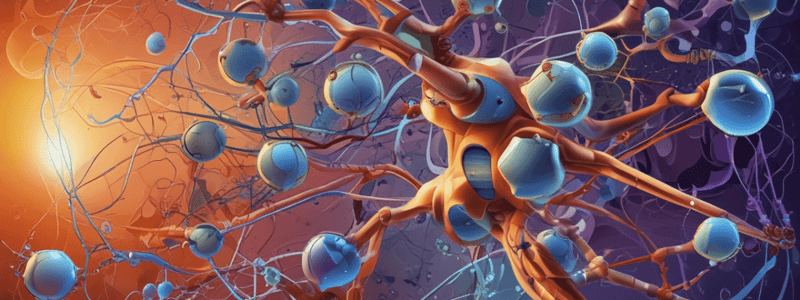Podcast
Questions and Answers
What is the primary function of sodium in maintaining normal cellular homeostasis?
What is the primary function of sodium in maintaining normal cellular homeostasis?
- Transporting nutrients and substrates through plasma membranes
- Maintaining osmolality of the extracellular fluid
- Regulating fluid and electrolyte balance (correct)
- Directly influencing muscle and nerve cell excitability
What is the term for a condition where the total body sodium is low?
What is the term for a condition where the total body sodium is low?
- Hyponatremia (correct)
- Electrolyte imbalance
- Hypernatremia
- Sodium deficiency
Which of the following is NOT a physiological function of sodium?
Which of the following is NOT a physiological function of sodium?
- Maintaining normal cellular homeostasis
- Transporting nutrients and substrates through plasma membranes
- Maintaining blood pH (correct)
- Regulating fluid and electrolyte balance
What is the primary location where sodium is found in the body?
What is the primary location where sodium is found in the body?
What is the consequence of low sodium levels in the serum?
What is the consequence of low sodium levels in the serum?
What is the mechanism by which sodium regulates extracellular fluid volume?
What is the mechanism by which sodium regulates extracellular fluid volume?
What is the primary cause of hypernatremia?
What is the primary cause of hypernatremia?
What is the effect of high sodium intake on calcium levels?
What is the effect of high sodium intake on calcium levels?
What is the primary function of potassium in the body?
What is the primary function of potassium in the body?
What is the cause of hypokalemia?
What is the cause of hypokalemia?
What is the effect of high potassium levels in blood?
What is the effect of high potassium levels in blood?
What is the primary function of magnesium in the body?
What is the primary function of magnesium in the body?
What is the effect of magnesium on insulin secretion?
What is the effect of magnesium on insulin secretion?
What is the primary location of magnesium in the body?
What is the primary location of magnesium in the body?
Flashcards are hidden until you start studying
Study Notes
Sodium
- Mostly found in blood and extracellular fluid (ECF)
- Excreted mainly in urine
- Physiological functions:
- Maintains normal cellular homeostasis
- Regulates fluid and electrolyte balance and blood pressure
- Main regulator of ECF volume through its osmotic action
- Transports nutrients and substrates through plasma membranes
- Important for the excitability of muscle and nerve cells
- Sodium-associated diseases:
- Hyponatremia (serum Na < 135 mmol/L): water leaves blood and enters cells, causing cell swelling
- Hypernatremia (serum Na > 145 mmol/L): decrease in total body water relative to electrolytes, causing water to leave cells and enter blood
- Excessive sodium intake: facial puffiness, high blood pressure, heart disease, and stroke
Potassium
- Mostly found inside cells, present in all body tissues
- Excreted mainly in urine, with some in sweat and stool
- Strong relationship with sodium
- Physiological functions:
- Essential for normal cell function
- Maintains intracellular fluid volume and transmembrane electrochemical gradients
- Helps preserve acid-base balance and maintain isotonicity and electrodynamic cellular function
- Activates many enzymes, e.g., pyruvate kinase
- Essential for transmission of nerve impulses, contraction of cardiac muscles, skeletal and smooth muscles, tissue synthesis, gastric secretion, and renal function
- Relaxes walls of blood vessels, lowering blood pressure
- Diseases associated with potassium:
- Hypokalemia (< 3 mmol/L): low levels of K in blood, caused by excessive K loss in urine or low K intake
- Hyperkalemia (> 6.0 mmol/L): high levels of K in blood, can be life-threatening, causing heart muscle activity reduction, weakness, and paralysis
Magnesium
- 50% of body's magnesium is in bone, with very little in blood
- Physiological functions:
- Cofactor in various structures/enzymes that regulate reactions
- Protein synthesis, muscle and nerve function, blood pressure regulation
- Required for energy production, oxidative phosphorylation, and glycolysis
- Regulates insulin secretion in pancreatic beta cells
- Critical for phosphorylation of insulin receptor
- Contributes to formation (structural development) of bone and teeth
- Diseases associated with magnesium:
- Hypomagnesemia: too low levels of magnesium in blood
Studying That Suits You
Use AI to generate personalized quizzes and flashcards to suit your learning preferences.




